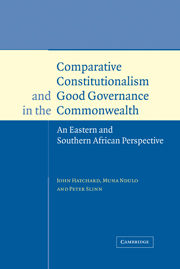 Comparative Constitutionalism and Good Governance in the Commonwealth
Comparative Constitutionalism and Good Governance in the Commonwealth Book contents
- Frontmatter
- Contents
- Preface
- List of cases
- List of constitutions
- List of statutes
- List of other instruments
- Map
- Introduction
- 1 The democratic state in Africa: setting the scene
- 2 Constitutions and the search for a viable political order
- 3 Devising popular and durable national constitutions: the new constitutions of the 1990s
- 4 Perfecting imperfections: amending a constitution
- 5 Presidentialism and restraints upon executive power
- 6 Enhancing access to the political system
- 7 Making legislatures effective
- 8 The judiciary and the protection of constitutional rights
- 9 The devolution of power to local communities
- 10 Developing autochthonous oversight bodies: human rights commissions and offices of the ombudsman
- 11 Seeking constitutional control of the military
- 12 Constitutionalism and emergency powers
- 13 Constitutional governance: the lessons from southern and eastern experience
- Bibliography
- Index
5 - Presidentialism and restraints upon executive power
Published online by Cambridge University Press: 23 June 2009
- Frontmatter
- Contents
- Preface
- List of cases
- List of constitutions
- List of statutes
- List of other instruments
- Map
- Introduction
- 1 The democratic state in Africa: setting the scene
- 2 Constitutions and the search for a viable political order
- 3 Devising popular and durable national constitutions: the new constitutions of the 1990s
- 4 Perfecting imperfections: amending a constitution
- 5 Presidentialism and restraints upon executive power
- 6 Enhancing access to the political system
- 7 Making legislatures effective
- 8 The judiciary and the protection of constitutional rights
- 9 The devolution of power to local communities
- 10 Developing autochthonous oversight bodies: human rights commissions and offices of the ombudsman
- 11 Seeking constitutional control of the military
- 12 Constitutionalism and emergency powers
- 13 Constitutional governance: the lessons from southern and eastern experience
- Bibliography
- Index
Summary
Presidentialism in … Africa has tended towards dictatorship and tyranny, not so much because of its great power as because of insufficient constitutional, political and social restraint upon that power …
The exercise of presidential power
Like others the world over, constitutions in the ESA states typically provide for an executive arm of government with specific powers and responsibilities. Yet the necessity for government creates its own problems and in particular the problem of how to limit the arbitrariness inherent in government and to ensure that its powers are used for the good of society. In any political system, whilst the executive is often the major initiator and executor of public policies it also has the potential for operating as a super-ordinate branch of the political system with tentacles that stultify the other branches.
A president heads the executive branch of government in all the ESA states, with the exception of Lesotho and Swaziland. As Head of State, Head of Government and Commander in the Chief of the armed forces, the president necessarily enjoys considerable constitutional powers and duties. Responsibilities include assenting to Bills; convening and presiding over Cabinet meetings; appointing and dismissing Cabinet and other ministers; exercising the power of pardon and the prerogative of mercy; and declaring a state of emergency.
- Type
- Chapter
- Information
- Comparative Constitutionalism and Good Governance in the CommonwealthAn Eastern and Southern African Perspective, pp. 57 - 98Publisher: Cambridge University PressPrint publication year: 2004


